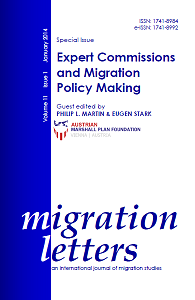Independent migration commissions in Europe: The case of Austria
Independent migration commissions in Europe: The case of Austria
Author(s): Gudrun BifflSubject(s): Migration Studies
Published by: Transnational Press London
Keywords: Migration; demand and supply driven migration; third country migrants; asylum and migration advisory board; expert council commission;
Summary/Abstract: Austrian migration policy changed from a demand driven guest worker model between the 1960s and 1980s to chain migration, family reunion and refugee migration in the 1990s. Membership to the EU in 1995 was accompanied by economic migration from other EU-member states due to faster-than-average economic growth in Austria. Population ageing and insufficient investment in further education and training led to labour scarcities and migration policy reforms in 2011 and gave employer demand a key role in selecting immigrants under a point-system adapted from the Canadian and Australian models. While many elements of the Austrian system are highly developed, there is in-sufficient coordination among federal agencies. Austria may look to the coordinator of integration policies as a model for improving the coordination of policies to guide skilled labour migration.
Journal: Migration Letters
- Issue Year: 11/2014
- Issue No: 1
- Page Range: 43-53
- Page Count: 11
- Language: English

